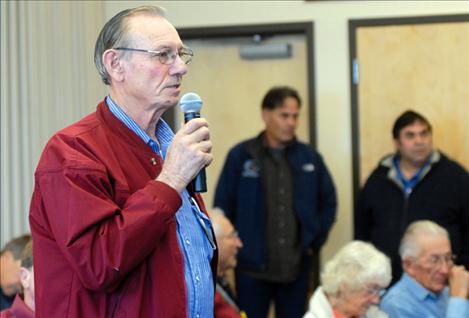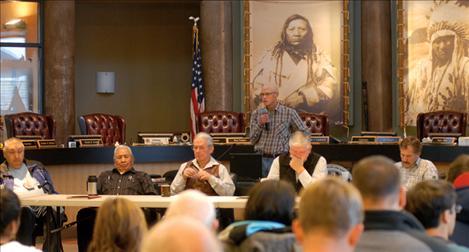Drafts of compact, ordinance presented
Hey savvy news reader! Thanks for choosing local.
You are now reading
1 of 3 free articles.
PABLO — Bill Schultz from the Montana Department of Natural Resources and Conservation Water Resources Division narrated a PowerPoint presentation on complete drafts of the reserved water rights compact and ordinance at the Oct. 24 water rights negotiation session.
Negotiating team from the Confederated Salish and Kootenai Tribes, the State of Montana Reserved Water Rights Compact Commission and the United States attended.
The proposed compact is composed of eight articles, and Schultz ran through each one.
Of particular interest are Article 3, containing the Flathead Indian Irrigation Project agreement, which is still under negotiation, and Article 4, which lays out implementation and explains the make-up of the water management board.
The complete drafts of the compact and the ordinance are available online at www.cskt.org/tr/nrd_waternegotiations.htm and www.dnrc.mt.gov/rwrcc/Compacts/CSKT/Default.asp.
Both drafts are works in progress, and copies of them were distributed at the negotiation session.
Schultz noted some changes have been made, mostly lettering and numbering, language on public meetings and record, information on a quorum of the water management board and powers and duties of the board. The resolution of disputes arising from the FIIP water use agreement is also new.
During a question-and-answer period, questions ranged from how much the board will be paid to a question from Elsa Duford on tribal religious uses of water to inquiries from Sen. Verdell Jackson, R-Senate District 5, on off-reservation water.
CSKT attorney Rhonda Swaney answered Duford, saying the religious and cultural uses are non-consumptive and private.
“We don’t want to disclose the place, time or uses, traditional uses,” Swaney said, adding that they are private.
CSKT Natural Resources Department Chair Clayton Matt added that water reserved for cultural and religious serves more than one purpose.
“It acknowledges the 10,000 years of tribal residence on this place,” Matt said. “This culture and religion is practiced today and will be practiced for another 10,000 years.”
Water used for all hunting, all fishing, all gathering, and all plant and animal resources that the CSKT tribes strive to protect will not be specifically quantified in the abstracts.
“It is very broad, very complicated and very sensitive to the tribes,” Matt said.
The issue of how the board will actually be paid is one of the last outstanding issues, according to John Carter, CSKT attorney.
Montana Reserved Water Rights Compact Commission Chair Chris Tweeten said outreach efforts would accelerate, so optimistically the compact could go to the 2013 Montana Legislature in January.
“Our desire is to get it (the draft compact) out in front of the public in as many places as we can,” Tweeten added.
The next negotiation session is scheduled for Nov. 28 at 9 a.m.


















